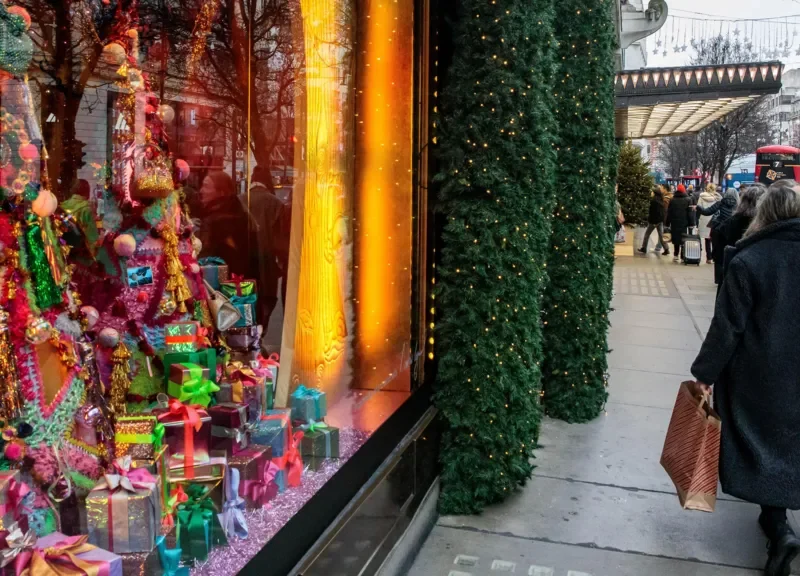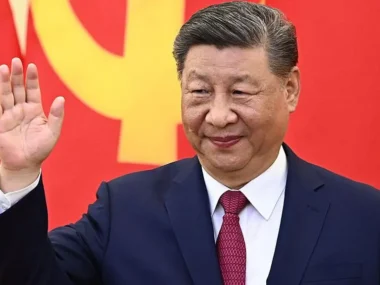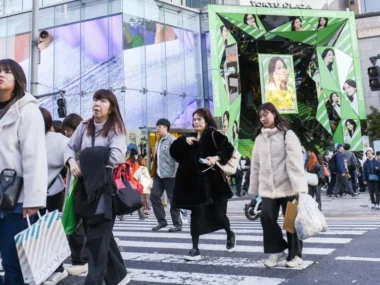Gift-giving, with traditions like Secret Santa, stockings, and presents under the tree, is central to Christmas Day.
But is it necessary?
This year, more people have embraced underconsumption, a trend where extravagant shopping sprees are swapped for reusing cherished items and buying less. This movement gained significant traction on TikTok, with mentions in the UK increasing by nearly 40,000% earlier this year.
Experts suggest it resonates particularly with younger people grappling with the cost-of-living crisis and concerns about climate change, as they seek more sustainable habits.
However, the question remains: Can this minimalist approach coexist with the festive season, often linked to excess and overspending?
Underconsumption involves buying fewer unnecessary items and making the most of the products you already have.
It may not seem revolutionary, especially for those who are accustomed to managing a tight budget.
“It’s emphasizing a behavior that’s actually quite common,” says author and creator Andrea Cheong in an interview with BBC Newsbeat.
However, on platforms like TikTok and Instagram, which are driven by ads and idealized lifestyles, the hashtag has gained viral attention. Cheong believes underconsumption stands out because it’s a habit, not just a passing trend.
She explains that those sharing their underconsumption practices online have likely been living this way for a long time, often taught by their parents to be mindful of consumption.

Andrea Cheong has authored a book focused on making more sustainable fashion choices.
At Christmas, opting to buy and consume less can be difficult due to the influence of high-budget marketing campaigns, the expectation of gift-giving, and the lavish home decor showcased online.
“Companies are spending millions on ads that make you want to rush out and buy something,” says Darwin Arnold, a retail worker from Brighton.
Darwin, who shares sustainability tips online in her free time, admits she doesn’t want presents this Christmas. However, she finds the “hardest step” is telling her family, especially her grandmother, who sees giving gifts as a way to show love and make her feel special.
Darwin suggests being honest with loved ones and recommending alternative gift ideas, like experiences, rather than material items.

Darwin Arnold advises that taking a pause before making a purchase can help prevent impulse buying.
Influencer Charlie Gill, from Manchester, has been sharing sustainability tips on social media for six years and says her content has gained popularity since the rise of the underconsumption trend.
She has shifted her focus to Christmas, offering ideas on how to simplify decorations, gift wrapping, and even holiday meals. “There are many small steps anyone can take,” she explains. “Think about how much food you’re buying, avoid excess, and make sure to eat your leftovers.”
Charlie creates her own decorations, including a Christmas tree made from a magazine and stars crafted from toilet rolls. While some people don’t appreciate the homemade look, Charlie admits she received negative feedback on a TikTok video showcasing her festive decor last year, but it hasn’t deterred her.
“I don’t think there’s anything wrong with celebrating Christmas differently,” she says. “There are various ways to gift and create a Christmas that minimizes waste while still being meaningful.”

Charlie Gill believes Christmas can still be meaningful and special without the need for excessive purchases.
Underconsumption may be a trendy hashtag, but it’s not a new concept.
“It’s not a new issue, but it’s a persistent phenomenon that has been framed in different ways throughout history,” says Prof. Caroline Moraes from the University of Birmingham.
She points to the voluntary simplicity movement of the 19th century, which promoted an anti-consumerist lifestyle, as an early example.
Prof. Moraes, a marketing and consumer expert focused on sustainable consumption, believes the renewed interest in underconsumption in 2024 reflects current concerns. It highlights growing awareness of environmental issues, the cost-of-living crisis, and increasing attention to brand ethics and the origins of the products we buy.
“The role we must play.”
Earlier this year, fast fashion giant Shein reported discovering two cases of child labor in its supply chain, while some luxury perfumes have also been linked to child labor. Concerns about the fashion industry’s environmental impact have also been widely discussed.
“I think we’re all starting to realize the role we must play in addressing the sustainability challenges and climate crisis,” says Prof. Caroline Moraes.
Author Andrea Cheong believes the rising interest in underconsumption reflects a fatigue with consumer culture. “People like me are excited about underconsumption because we share a mission to ‘just slow down,'” she explains. “But really, it’s about the lack of control over the cost of living.”
Recent figures show prices are rising at their fastest rate since March. While the cost of a Christmas dinner has decreased due to cheaper turkey and sprouts, prices for potatoes, carrots, and parsnips have surged.
Andrea adds, “When life feels chaotic and overwhelming, people often seek out slower, more mindful ways of living.” Though trends come and go, the individuals Newsbeat spoke to hope underconsumption will inspire lasting changes in shopping habits year-round.
“We’re conditioned to think we need to consume more, especially during this time of year,” says Prof. Caroline. “Trying to reduce consumption challenges the norms of consumer culture. It’s encouraging to see influencers questioning excessive consumption and promoting a more balanced approach.”
Charlie Gill has noticed that many people are engaging with her sustainability message. “It’s about everyone trying to live a bit more sustainably in their own way, because every small action can make an impact.”











